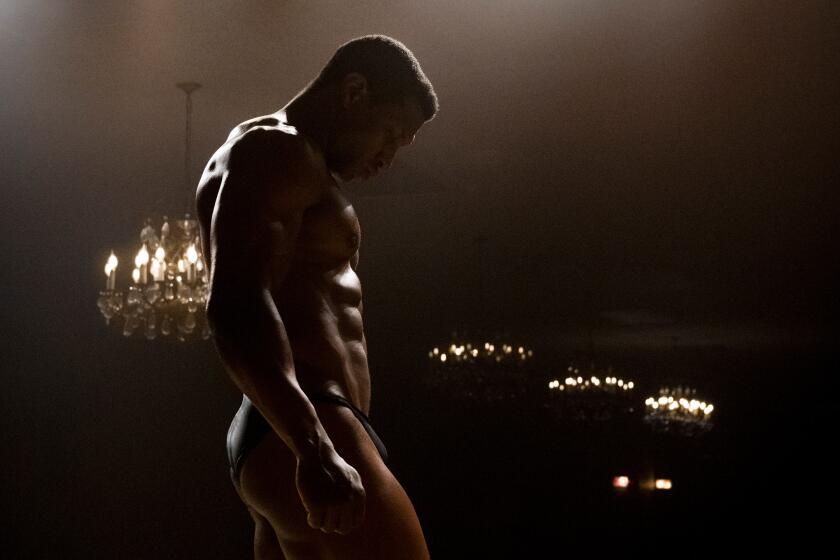Trading Places: Film Producer Goes Back to the Basics
- Share via
In the movie “Teachers,” a disillusioned Nick Nolte, having a drink with the school vice principal, mutters: “I’m just getting tired of the whole damn thing.”
Who could identify with that better than the executive producer of the film? Six years earlier, after having taught English for nine years at a Long Island, N.Y., high school, Irwin Russo threw in the towel.
“The crisis was mine,” he recalled. “I didn’t know what I wanted to communicate. By 1978, when I left teaching, I wasn’t clear about what it was that kids should know about society.
“My brother, Aaron, was Bette Midler’s personal manager, and he invited me to come out to L.A. and help develop movie scripts for her. Just a few months after I began doing that, my brother and Midler split professionally, so Aaron and I decided to develop scripts for production independently.”
A ‘Glamorous Girlfriend’
Along the way there were such successes as the 1983 movie “Trading Places,” about a rich stockbroker who changes places with a con man, and in 1984, “Teachers.”
However, Russo’s former profession refused to go away quietly. “I found that Hollywood was the glamorous girlfriend, but that teaching was the woman I had married,” Russo said.
So three years ago, about the same time “Teachers” hit the movie houses, he began pondering something: How about a mid-life career change, more accurately, a return to the way he used to make a living.
“My wife, Jane, gave me a lot of encouragement. She said that, deep inside, teaching was what I wanted to do.”
Then two years ago, the couple became the parents of their first child, Spencer, and education became a frequent topic of family conversation.
As of a couple of weeks ago, Russo was in action again--this time working not with celluloid, but rather with the minds of children.
In front of 20 students in a combined ninth- and 10th-grade English class, a portly, white-haired man, glasses dangling from his neck, paced restlessly as he asked, debated, argued, agreed.
The subject was a work of fiction about a well-off kid who starts dealing drugs.
“On the nose,” the teacher responded to a student’s answer. “His parents want him to be them, not him.”
The class was one of four Russo would instruct that day at the Newbridge School in Los Angeles, a non-sectarian private school with an enrollment of about 200 in grades kindergarten through 12.
“Could you be honest enough to tell me,” he asked his students at one point, “do you still feel dependent on your parents?”
“Yeah,” someone answered.
The teacher leveled with them: “I am 48, and I’m still afraid in life.”
By now, everyone in the room was into it, and the 45 minutes raced by--an advertisement for the participatory philosophy encouraged at the 16-year-old Newbridge School.
The school is college preparatory for most, and Russo earlier had advised the class: “I want you to get used to underlining your book. This is the way kids do it in college.”
Then he had chalked a few words onto a board: incredible ... oblivious ... belligerent-- and asked that their meanings be looked up afterward. He reminded everyone of an open-book test that would be coming up, and his audience headed for the door.
“I feel that he is an inspiration to me,” 14-year-old Joshua Katz said.
Martin Groen, 15, when asked how he would grade his teacher, was complimentary indeed: “So far I give him an A-minus.”
“On the first day in class, a couple of weeks ago, I was very nervous,” Russo confessed while munching a sandwich afterward. “You always wonder if you are going to connect.
“It’s hard work, hard to keep it going, to try and keep their interest up.”
And now, instead of reading scripts and calling agents when he returns to his Studio City home, he prepares the next day’s lessons.
The economics of it all? Earning a salary between $20,000 and $30,000 isn’t quite what he was used to in the movie business.
“I’m not independently wealthy,” he said, “but I am financially conservative. I saved with this day in mind.
“Nobody wants to give up the beautiful life, but there are certain things that fill the soul.”
Myron Jacobson, the headmaster who founded Newbridge, recalled that they met after the school was recommended to Russo by a woman they both knew who had a grandchild enrolled there.
Russo came to the school’s spring carnival with his wife and son.
Hard Switch to Make
“I just wanted to ask him (Jacobson) what was doing in the teaching business,” Russo said. “It’s a tough segue, not easy to make such a career switch.”
It was just a get-acquainted talk. “I was thinking in terms of a year or two from now,” he continued. “To be honest, I wanted to be more comfortable, maybe make another movie.”
In the summer, however, in the midst of a series of phone calls with film executives, Russo got a call of a different nature. It was from Jacobson. A teaching position had opened up.
“It caught him by surprise,” Jacobson remembered. “But he came over, we had a series of interviews, he met with the staff and he is on the faculty.”
Perhaps it’s too early for an accurate reading, but does he know now what he wants to say, what kids should learn about society?
“I’m hoping the kids today will be interested in understanding themselves and the culture in which they live,” Russo said. “I think that more than ever, they need guidance and a strong moral force.”
More to Read
Only good movies
Get the Indie Focus newsletter, Mark Olsen's weekly guide to the world of cinema.
You may occasionally receive promotional content from the Los Angeles Times.










